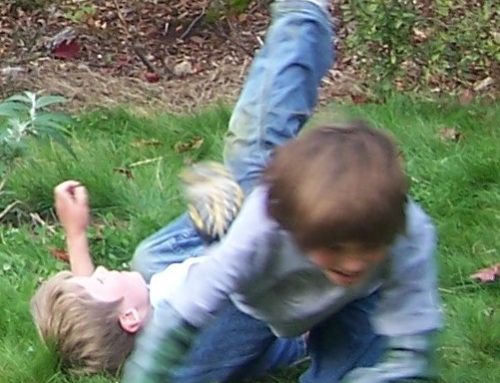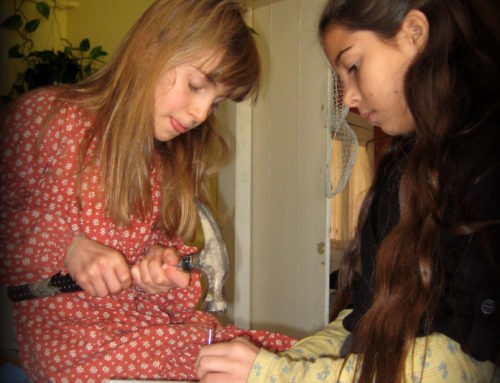Most parents want their children to grow up to be considerate of others and to be contributing members of society and their community but, so often, parents attempt to achieve this end through methods of manipulation and coercion. Such methods not only fail to cultivate in the child the desired feeling of care or compassion, but have other detrimental and perhaps opposite affects on the child. While we can sometimes get people to change their actions through such methods, it seems to me that it is impossible to cultivate, in this way, the inner feelings to match these actions. How do we help to foster and cultivate in others true feelings of compassion, consideration and mutual aid such that they arise spontaneously from within? How do we insure that children are not just performing empty actions taken out of obedience to authority but are really learning to take into consideration the needs and wishes of others?
Say You’re Sorry
Sidney (4 ½) is rough with Ana (1½) and Amy grabs him and tells him to apologize… he does it in a sort of insincere manner and tries to keep running around the kitchen. Amy stops him and angrily tells him that his apology is not good enough…
I wonder what a more effective approach would be, how to approach this issue from a power-with perspective that does not demand that a person behave a certain way but offers an opportunity for understanding. Demands for apology do not teach compassion or empathy but only create resentment to authoritarian forces. Should someone be made to apologize if they do not feel sorry? If we force children to say they are sorry when they are not, are we not then teaching them that we value politeness and obedience over sincerity and honesty?
What do we want to teach when we tell kids to apologize, and how can we do it in a more constructive way? Do we really care about the words “I’m sorry” or are we wanting them go care about others? Perhaps in the above situation, opening conversation and sharing personal experience can help Sidney to understand why his roughness is not appreciated. Statements like “When you grabbed Ana I noticed that she cried and I felt really sad because I really care about her and want her to feel happy and safe” Then we could ask him if he might be willing to see how she is doing. In this way we are not punishing him for his roughness but inviting him to have concern for others. Marshall Rosenberg’s non-violent communication can offer a lot in this regard and teach us how to communicate with children in a compassionate, power-sharing way. This work can help us get out of moralistic judgments of right and wrong, which diminish connection understanding, and really express what we are needing and how we would like things to be different. Instead of making the child wrong in a way that he only fears punishment or being wrong again, we can help him understand our concern and connect him to a new way of being.


I love your blog! I will definitely be thinking more on missed opportunities for my kids to connect. My consciousness is rising ‘cuz of you!
Wonderful Blog Elana! Love the well thought out example. Reconnecting to a compassionate consciousness (heart awareness) after behaving unconsciously requires the willingness to take the time needed to reconnect. True presence connects and transforms the rushed actions into loving presence and understanding. Your blog and the work you are doing is part of the transformational revolution our culture needs in order to allow peace and happiness to flow back into our lives. I am grateful for the work you are bringing into the world. Bravo!
have you seen this????
http://www.youtube.com/watch?v=zDZFcDGpL4U&feature=player_embedded
Pam, thanks for sharing this video, I had not seen it before. I’ve really enjoyed it and shared it on my facebook page.
I’d love to hear from readers if there’s any topics in particular they’d like to see addressed in this blog….
thanks for reading!
Yes, and ROLE MODELING & embodying caring and empathy as the grown up is critical, too. In a play group with my friend’s toddler, I witnessed a woman who continually scolded her little daughter, demanded she apologize to other kids for every little thing, and made her sit by herself in “time-outs” repeatedly. It was terrible! More importantly, it was hypocritical and crazy-making because there was nothing kind, caring, patient, or understanding in the energy, words, or actions of the mother. The daughter was just being shamed and manipulated all the time, and receiving a ton of her mother’s pent-up anger. What will she learn? 1. That there’s something terribly and un-identifiably wrong with her 2. That shaming and punishing self and others is the way to navigate relationships and life.